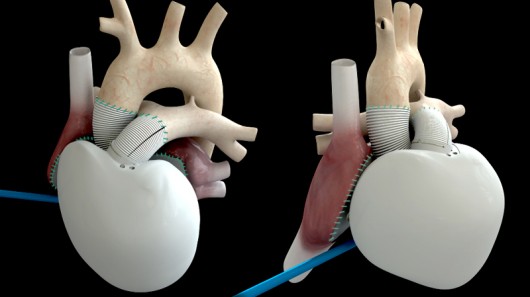The second patient implanted with a Carmat artificial heart has gone home, opening the way for others enrolled in the French company’s clinical trial to receive the devices.
Carmat designed its self-regulated, bioprosthetic heart as a permanent implant for patients with end-stage heart failure. The first trial participant who received the heart died 75 days later, likely due to a short circuit in the device.
The second patient, 68, went home Jan. 2, five months after the operation at the University of Nantes hospital, according to a reportin the French newspaper Le Parisien.
The married father of two learned how to use the portable, silent, electric system that controls the heart before leaving the hospital, according to a statement by Carmat.

Carmat's artificial heart now has been implanted in two patients—and could be soon implanted into more.
The company—which is headquartered in the Paris suburb of Vélizy-Villacoublay—said the lightweight system “provides patients with mobility and autonomy in excellent conditions.”
He “is living a completely normal life at home,” even “pedaling like crazy” on a stationary bike, device inventor and company co-founder Alain Carpentier, MD, told Le Parisien. Before the operation, the patient could only move from his bed to a chair, the report said.
The company plans to enroll two more patients in its current clinical trials and publish a study when the trials are complete, Carmat spokesperson Caroline Carmagnol told the New York Times.
Carmat’s stock surged more than 11% to 78 euros ($90) per share on the news.
If the technology works as a long-term fix for a wide patient population, Carmat and other artificial heart makers would have accessto a huge market.
Carmat estimated that 20 million patients in Europe and the United States suffer from heart failure, including tens of thousands at the irreversible end-stage of the disease.
Roughly 600,000 people in the United States die from heart disease each year, accounting for one in four deaths, according to the Centers for Disease Control. Complicating matters is that heart transplants are in short supply, and can help only a tiny fraction of patients with chronic terminal heart failure.
The number of artificial heart transplant surgeries is on the rise, noted journalist and futurist Zoltan Istvan in a Motherboard article last year. More than 1,000 artificial hearts have been used—albeit for short- term use—in the past 35 years. In addition, more than 11,000 left-ventricular assist devices (LVADs) have been implanted. Artificial hearts have been traditionally used to buy time while waiting for a conventional heart transplant.





